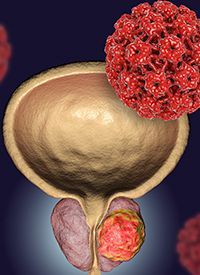Article
Abiraterone/Prednisone Combo Linked With Improvements in Fatigue and QoL, But Worsening Metabolic Changes in mCRPC
Author(s):
Abiraterone acetate plus prednisone should be considered as the first treatment choice for patients with newly diagnosed metastatic castration-resistant prostate cancer if fatigue is a concern.

Abiraterone acetate (Zytiga) plus prednisone should be considered as the first treatment choice for patients with newly diagnosed metastatic castration-resistant prostate cancer (mCRPC) if fatigue is a concern. However, the regimen has been associated with metabolic worsening compared with enzalutamide (Xtandi), according to data from the randomized, phase 4 HEAT trial (NCT01794403) that was presented during the 2021 European Association of Urology (EAU) Congress.1
Results showed that abiraterone plus prednisone was associated with the highest increase in quality of life (QoL), while enzalutamide was associated with the highest incidence of increased fatigue in patients, according to Klara Kvorning Ternov, a clinical assistant in the Department of Urology at Herlev and Gentofte Hospital in Herlev, Denmark.
However, abiraterone plus prednisone was associated with higher increases in weight, body mass index, visceral fat, and glycated hemoglobin, as well as the highest incidence of type 2 diabetes, Ternov said. Additionally, enzalutamide was associated with negative changes in cholesterol, including higher increases in low-density lipoprotein (LDL) cholesterol, and lower increases in high-density lipoprotein (HDL) cholesterol.
“Men with mCRPC often experience fatigue, impaired quality of life, and have an increased risk of cardiovascular disease and type 2 diabetes,” Ternov said during a virtual presentation of the data. “These highly burdensome symptoms, and the increase risk of morbidity, are often treatment-associated and may be reduced by opting [into] a particular treatment.”
In total, the investigator-initiated, single-center, open-label, phase 4 trial enrolled 170 patients who were randomized 1:1 to receive treatment with either enzalutamide at 160 mg daily (n = 84) or abiraterone at 1000 mg plus prednisone at 10 mg (n = 85), both daily.
Patients included on the study were those with mCRPC who experienced disease progression, despite undergoing treatment with androgen deprivation therapy, Ternov noted.
The primary end point of the trial was to examine changes in fatigue and QoL from baseline to week 12 of treatment, and secondary end points included changes in all components of metabolic syndrome, including insulin resistance, lipids, blood pressure, and fat distribution, Ternov said. Additional outcome measures included treatment differences in changed QoL, weight, body composition assessed with dual x-ray absorptiometry, glycated hemoglobin, and cholesterols and incidence of type 2 diabetes mellitus.
Changes were measured with the patient-reported questionnaire Functional Assessment of Chronic Illness Therapy-Fatigue (FACIT-Fatigue), Ternov said. The follow-up time was 12 weeks.
Reference
- Kvorning Ternov K, Sonksen J, Lindberg H, et al. Fatigue, quality-of-life and metabolic changes in men treated with enzalutamide versus abiraterone plus prednisone for metastatic castration-resistant prostate cancer (HEAT): a randomised trial. Presented at: 36th Annual European Association of Urology Congress; July 8-12, 2021; virtual. Abstract P0852.






%20(2)%201-Recovered-Recovered-Recovered-Recovered-Recovered.jpg?fit=crop&auto=format)

%20(2)%201-Recovered-Recovered-Recovered-Recovered-Recovered.jpg?fit=crop&auto=format)
%20(2)%201-Recovered-Recovered-Recovered-Recovered-Recovered.jpg?fit=crop&auto=format)